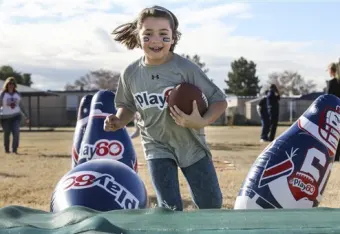Oral communication is one of the most important skills to be developed at a very young age as it goes on to help children communicate better, become more confident and face challenges accordingly. Every individual has their unique ability to learn the skill of communication.
Oral language basically indicates listening and speaking. Through the use of spoken words, we are able to express knowledge, ideas and feelings. Theoretically, oral language has certain important components that help understand the meaning of words and phrases, the rules of communication and the grammar rules. Children with good oral skills excel better in school and the afterlife. The more varied language exposure and words children get to learn, the better their vocabulary would be.
As the saying goes, home is the first school for children to learn and develop skills. Parents must communicate with children to develop and nurture their verbal communication skills at a very young age.
Table of Contents
Below listed are a few tips to develop oral language skills (11 Tips)
Each of the four domains of language that include oral, reading, writing and listening are very important to learn and correlate with each other in developing communication skills. It is not easy to teach children communication skills, so listed below are a few tips on how to improve and make oral language interesting:
Expose children to a wide range of activities
Children like to explore new things and get excited when they see different things. This is an advantage to build their communication skills wherein they can be repeatedly exposed to different books, words, phrases and conversations to develop strong communication skills.
Pique on the interests of children
Children like to listen, hear, see and talk about things they are interested in. See what the child is looking at and talking about, based on that build a conversation or a topic on that. For example; if a child likes cars then talk about which is their favourite car? What colour car is their favourite? Etc.
Engaging and interactive learning
Improving the oral language skills of children ensures that the conversation is not monotonous. Break the monotony by engaging the children with questions, riddles, expand on what the child says, and comment on their conversations.
Create practical contexts
It’s a basic human tendency to understand scenarios or conversations better with examples. Communicate more with pictures, practical examples or props. For example; When you talk about postman or post office, children would relate better if they are shown a picture or shown a live post office or postman. Playing with a child is also a good way to enhance their learning opportunities.
Importance of talking clearly
While getting them exposed to new words, phrases, books check if the child is able to understand what has been told or read. For a child to express a word, idea or feeling clarity is very important. Only when they understand, can they express themselves better. Tell them that when they talk it should be loud and clear to communicate effectively.
Positive conversation
Always maintain a positive conversation with children to make them feel skilled at conversations. Give them positive feedback on their conversations and ask them open ended questions for more scope to share their thoughts and ideas.
Importance of eye contact
Maintaining eye to eye contact is the most important factor in building good oral language skills. This further helps them to speak confidently anywhere and anytime in their career as well.
Encourage children through the thought process
Ask children questions that you don’t have answers to. Reflect on their opinions which gives them confidence that their ideas and feelings are valued.
Inculcate the habit of listening
Children at a very young age should be taught the importance of being good listeners. Encourage them with listening activities and tell them that when one stops the other should speak. This will help in developing good oral language skills.
Help children to learn and ask
When assigning activities to students ask them to get an object to talk about. When they are talking give instructions to other students to frame their questions about the object. Encourage more of the show and ask rather than show and tell.
Keep the conversations short
Limit the time for shorter discussions as a child’s attention wanders when the conversation is lengthy. If you feel that the topic discussed is not creating interest then give it a break.
Many of the schools concentrate on a curriculum that stresses the need of imparting communication skills to students. Few international schools in Dubai follow a curriculum that offers holistic development for students. One of the best schools in Dubai is the Global Indian International School which aims at not only making a student academically strong but also moulds them with ethics, values, communication, innovative and entrepreneurial skills to churn them into confident global citizens.
Let us know in the comments what you think would be a great strategy to improve the oral language skills of children.










